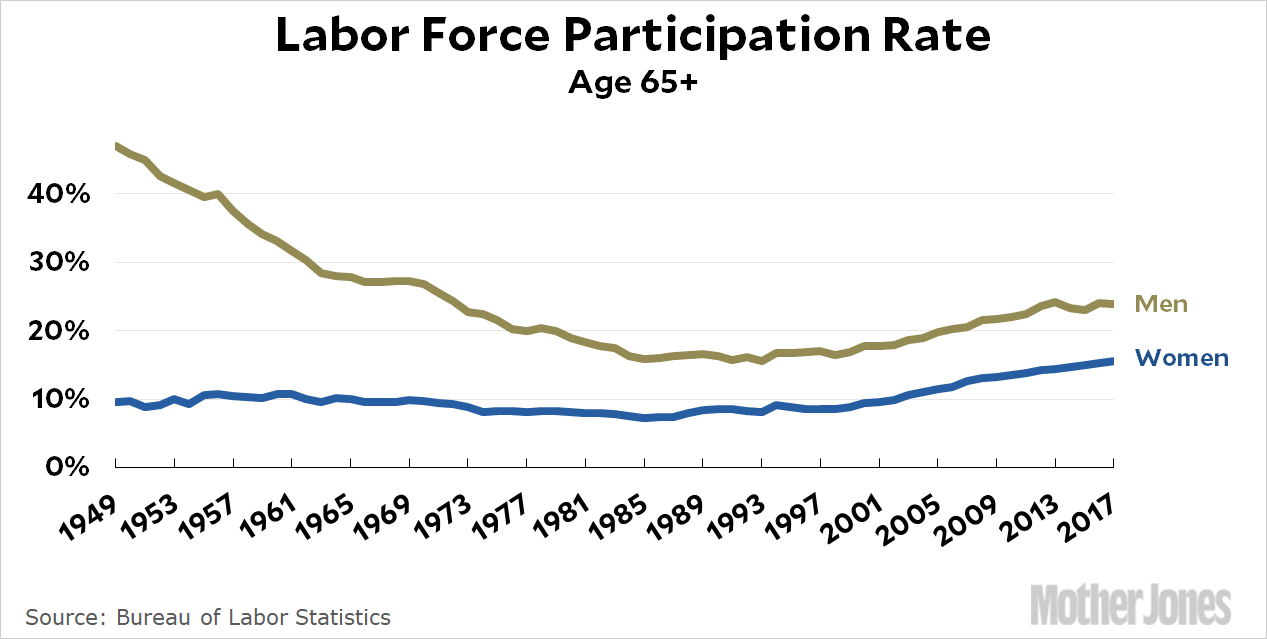The Washington Post writes today about seniors being forced to work forever thanks to the end of the traditional pension:
The way major U.S. companies provide for retiring workers has been shifting for about three decades, with more dropping traditional pensions every year. The first full generation of workers to retire since this turn offers a sobering preview of a labor force more and more dependent on their own savings for retirement.
….The notion of pensions — and the idea that companies should set aside money for retirees — didn’t last long. They really caught on in the mid-20th century, but today, except among government employers, the traditional pension now seems destined to be an artifact of U.S. labor history….In place of pensions, companies and investment advisers urge employees to open retirement accounts….The trouble with expecting workers to save on their own is that almost half of U.S. families have no such retirement account, according the Fed’s 2016 Survey of Consumer Finances.
None of this is wrong, but it presents far too rosy a picture of the past. Traditional pensions never covered more than half the workforce, and until the 70s more than a quarter of all men worked past 65:¹

The long mid-century decline in the number of working seniors was due to increasingly generous Social Security payments for the poor and the working class, not to traditional pensions that most of them didn’t have in the first place. That decline ended around 1990 and the number of people who continued working after 65 started slowly increasing—but again, this uptick had little to do with the end of pensions. It began in an era when traditional pensions were still pretty widespread among men aged 65+, whose working years spanned 1950-1990.
So what’s reponsible for the increase? Part of it is voluntary: as we’ve become healthier and longer-lived, some people just don’t want to retire. They like their jobs. The other part is involuntary: some workers can’t survive on Social Security and have to work to make ends meet.² There’s no firm survey data about this that I’m aware of, but roughly speaking it’s probably split about 50-50. This means that since 1990, the number of seniors who are working because they have to has increased about 4 percentage points.
Given what I’m about to say, there’s probably nothing I can do to persuade everyone that I think this is a bad thing. But it’s a bad thing. America has grown richer over the past three decades, and the number of seniors who work because they have to shouldn’t be increasing.
That said, the increase is small, and it’s almost certainly not related to the end of traditional pensions. The kind of people who are forced to work beyond 65 didn’t have pensions back in the day and they don’t have 401(k) plans today. They just have Social Security and whatever they’ve managed to save. The idea that a crappy economy and an end to traditional pensions means that everyone has to work forever just isn’t true and we should stop pretending otherwise.
And that said, the best solution to this problem is to increase Social Security payouts to the bottom third of the income spectrum. This could be done at relatively modest cost, and it would be by far the most effective way of making sure that everyone who wants to retire at 65 is able to.
¹Data for 1949-2007 here. Data for 2007-2017 here.
²A bit of this is also due to the increase in the full Social Security retirement age. There’s no data on how big an impact this has had, but it’s probably fairly small.

















